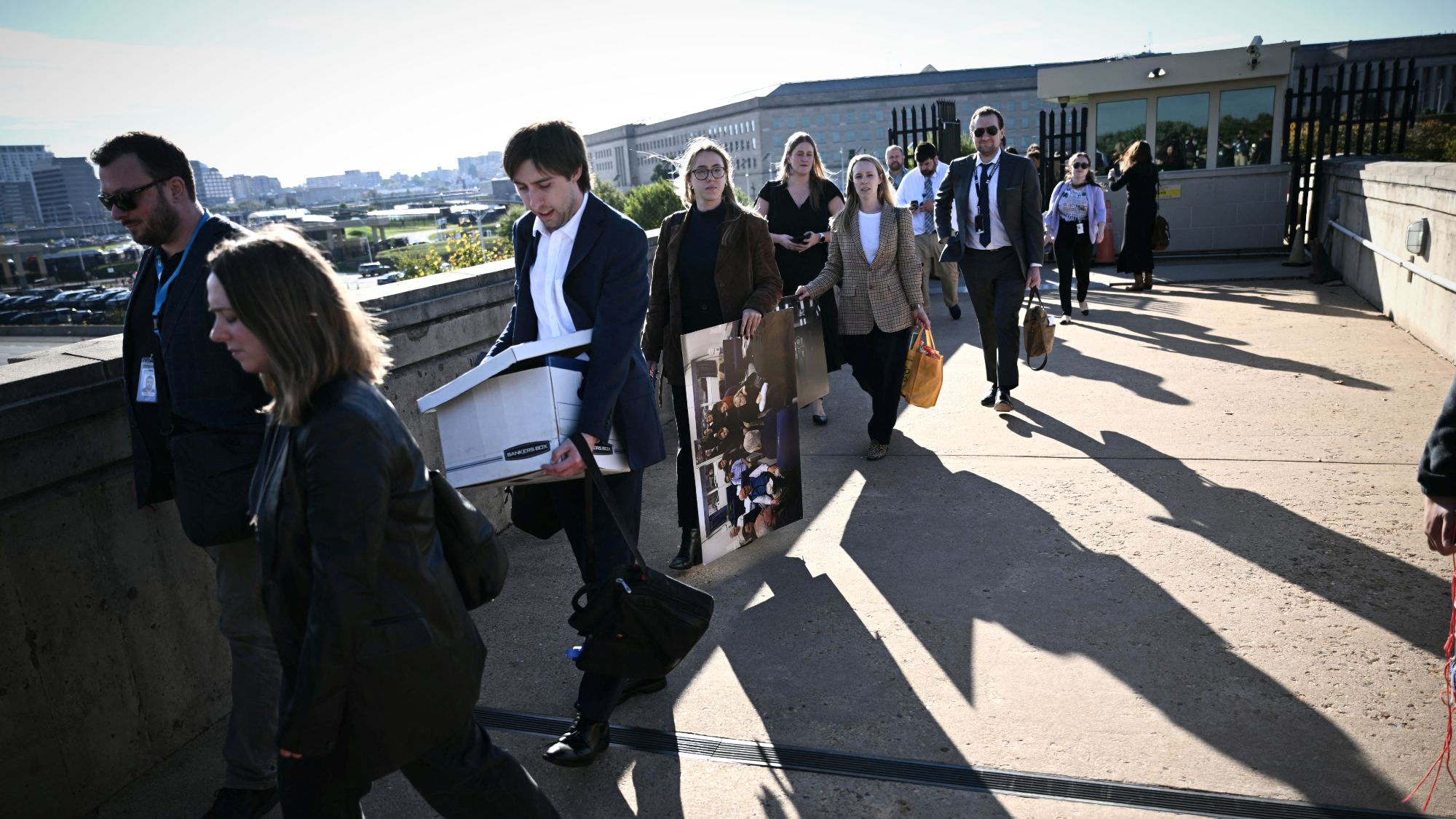Pentagon reporters turn in badges after refusing rules
They refused to sign a restrictive new press policy imposed by Defense Secretary Pete Hegseth


A free daily email with the biggest news stories of the day – and the best features from TheWeek.com
You are now subscribed
Your newsletter sign-up was successful
What happened
Dozens of reporters covering the Pentagon cleared out their desks and turned in their access badges Wednesday after refusing to sign a restrictive new press policy imposed by Defense Secretary Pete Hegseth. Leaving the Pentagon press area after 18 years was “sad,” said The Atlantic’s Nancy Youssef, “but I’m also really proud of the press corps that we stuck together.”
Who said what
News organizations were “nearly unanimous” in rejecting the new rules, which would “leave journalists vulnerable to expulsion if they sought to report on information — classified or otherwise — that had not been approved by Hegseth for release,” The Associated Press said. “They want to spoon-feed information to the journalist, and that would be their story,” retired U.S. Gen. Jack Keane said on Fox News, Hegseth’s former employer and one of the outlets that rejected the restrictions. “That’s not journalism.”
Hegseth’s “sweeping restrictions” on press access were “orchestrated with advice from his longtime personal lawyer” Tim Parlatore, whose “dual status as a mid-ranking military officer” and Hegseth’s civilian “legal fixer” has “troubled some defense officials,” The Washington Post said. Pentagon officials “anticipate” legal challenges to the rules.
What next?
News organizations “vowed they’d continue robust coverage of the military,” though they will be doing so “further from the seat of its power,” the AP said. Military officials tipped off reporters because “they knew the American public deserved to know what’s going on,” NPR’s Tom Bowman said in an essay. “With no reporters able to ask questions,” it appears Hegseth and his team will “rely on slick social media posts, carefully orchestrated short videos and interviews with partisan commentators and podcasters.”
The Week
Escape your echo chamber. Get the facts behind the news, plus analysis from multiple perspectives.

Sign up for The Week's Free Newsletters
From our morning news briefing to a weekly Good News Newsletter, get the best of The Week delivered directly to your inbox.
From our morning news briefing to a weekly Good News Newsletter, get the best of The Week delivered directly to your inbox.
A free daily email with the biggest news stories of the day – and the best features from TheWeek.com
Peter has worked as a news and culture writer and editor at The Week since the site's launch in 2008. He covers politics, world affairs, religion and cultural currents. His journalism career began as a copy editor at a financial newswire and has included editorial positions at The New York Times Magazine, Facts on File, and Oregon State University.
-
 Political cartoons for February 16
Political cartoons for February 16Cartoons Monday’s political cartoons include President's Day, a valentine from the Epstein files, and more
-
 Regent Hong Kong: a tranquil haven with a prime waterfront spot
Regent Hong Kong: a tranquil haven with a prime waterfront spotThe Week Recommends The trendy hotel recently underwent an extensive two-year revamp
-
 The problem with diagnosing profound autism
The problem with diagnosing profound autismThe Explainer Experts are reconsidering the idea of autism as a spectrum, which could impact diagnoses and policy making for the condition
-
 Judge blocks Hegseth from punishing Kelly over video
Judge blocks Hegseth from punishing Kelly over videoSpeed Read Defense Secretary Pete Hegseth pushed for the senator to be demoted over a video in which he reminds military officials they should refuse illegal orders
-
 Trump’s EPA kills legal basis for federal climate policy
Trump’s EPA kills legal basis for federal climate policySpeed Read The government’s authority to regulate several planet-warming pollutants has been repealed
-
 House votes to end Trump’s Canada tariffs
House votes to end Trump’s Canada tariffsSpeed Read Six Republicans joined with Democrats to repeal the president’s tariffs
-
 Bondi, Democrats clash over Epstein in hearing
Bondi, Democrats clash over Epstein in hearingSpeed Read Attorney General Pam Bondi ignored survivors of convicted sex offender Jeffrey Epstein and demanded that Democrats apologize to Trump
-
 El Paso airspace closure tied to FAA-Pentagon standoff
El Paso airspace closure tied to FAA-Pentagon standoffSpeed Read The closure in the Texas border city stemmed from disagreements between the Federal Aviation Administration and Pentagon officials over drone-related tests
-
 Judge blocks Trump suit for Michigan voter rolls
Judge blocks Trump suit for Michigan voter rollsSpeed Read A Trump-appointed federal judge rejected the administration’s demand for voters’ personal data
-
 US to send 200 troops to Nigeria to train army
US to send 200 troops to Nigeria to train armySpeed Read Trump has accused the West African government of failing to protect Christians from terrorist attacks
-
 Grand jury rejects charging 6 Democrats for ‘orders’ video
Grand jury rejects charging 6 Democrats for ‘orders’ videoSpeed Read The jury refused to indict Democratic lawmakers for a video in which they urged military members to resist illegal orders
